https://heated.world/p/lahaina-used-to-be-wetland?utm_source=substack&utm_medium=email
~~ recommended by newestbeginning ~~
Nature didn't turn the historic Hawaiian community into a tinderbox. People did.
Editor’s note: If you would like to support wildfire victims, the source for today’s story recommended this fund.
Kaniela Ing, a seventh-generation indigenous Hawaiian living in O'ahu, understands why most breaking news coverage of the horrific Maui wildfires describes the destroyed town of Lahaina as a tourist destination.
“If you’re not from Maui and your readers are not from Maui, they probably only relate to it that way,” he told HEATED in a phone interview on Friday.
Nevertheless, Ing—who is also the national director of the Green New Deal Network—wants to make sure people know that Lahaina is more than its nightclubs, shops, and rock n’ roll bars; that its value extends far beyond a Clint Eastwood movie or a celebrity home.
“Lahaina was the heart of Hawaii before statehood, before we were a territory, before we were illegally annexed,” he said. “The people who live on Front Street and adjacent to it tend to be some of the most rooted, most valuable keepers of indigenous wisdom in the world.”

On Thursday, Hawaii Governor Josh Green deemed the Maui wildfires the “largest natural disaster in Hawaii's state history." On Saturday, the official death toll had risen to 80, with the most catastrophic damage concentrated in Lahaina.
As the world’s eyes fixed on the community, Ing said Lahaina’s pre-colonial history is particularly important for people to know—not just for the sake of Lahaina’s Native residents, but because it reveals the deeply unnatural roots of this so-called “natural” disaster.
It was only because of colonization and climate change that it became a tinderbox.
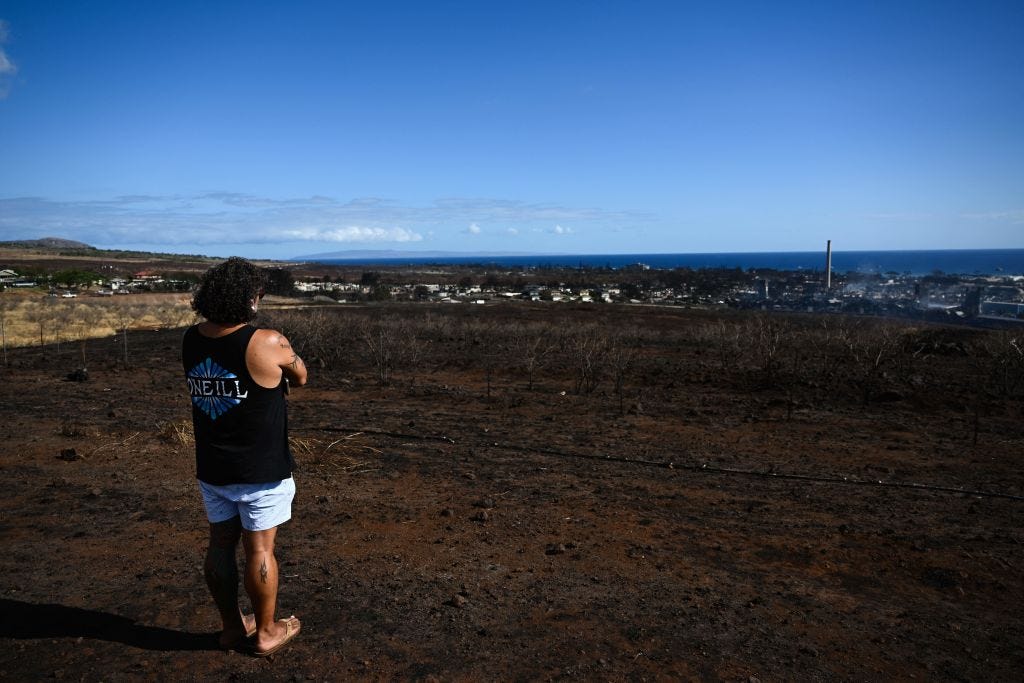
How the “breeding ground of aquaculture” burned to the ground
Quotes from Kaniela Ing, as told to Emily Atkin
“Lahaina wasn’t always a dry, fire-prone region. It was very wet and lush, historically. Boats would circle the famous Waiola Church. Lahaina was also the breeding place of aquaculture. It had some of the world's first and most innovative systems of fish ponds.
”But at the dawn of the 18th century, sugar barons arrived and illicitly diverted the water to irrigate the lands they had stolen. (Note: 18th century European sugar and pineapple barons also brought invasive grasses, Wired reports, which now cover 26 percent of Hawaii and become “explosive” fuel for wildfires.)
“Today, descendants from those same barons amass fast profits from controlling our irrigation, our land use, and political influence. Alexander and Baldwin are two big missionary families of the original oligarchs, and they’re currently the largest landowners on Maui. That’s the name of their corporation and they’re one of the top political donors here today.
“So on one hand, the climate emergency caused this. On the other, it’s also that history of colonial greed that made Lahaina the dry place that it is.
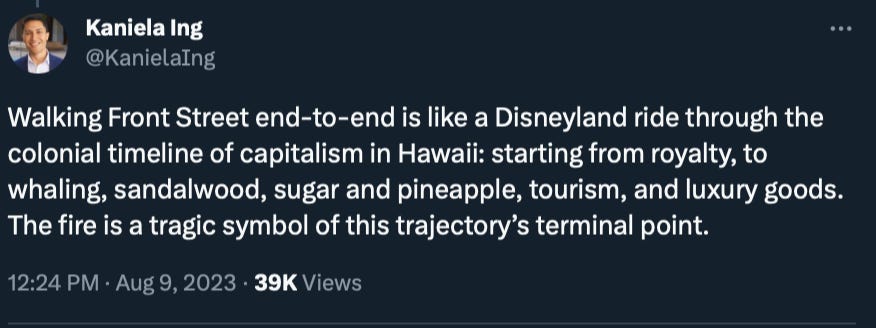
“This greed is only going to continue if we don’t stop it. Right now, on my home island, there are disaster capitalists that are meeting with elected officials, salivating at the models, trying to figure out how to exploit the situation and rebuild Lahaina in a way that's unrecognizable to anyone with any roots there.
“So as we rebuild—putting on the Green New Deal hat—it’s crucial that we uphold the Green New Deal’s vision of public lands, stewardship and water rights. It’s not just climate mitigation and adaptation. It’s also returning the control of our public trust resources into the hands of the public.
“I know it can sound a little wonky or too aspirational. But I was walking through the main evacuation facility yesterday, talking to folks and helping move goods, and they were telling me that exact thing. They're like, “I just want to get back and start building houses, helping my neighbors.” They’re like, “What if we could just raise some money, buy back some of the land, and control it ourselves?” It’s intuitive.
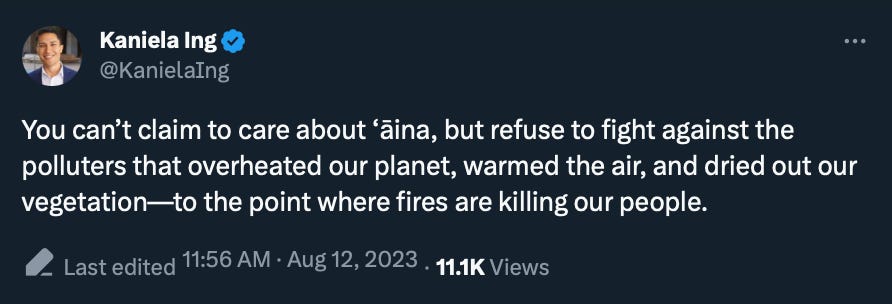
“I think this is an opportunity to build community in a way that it's harder to do normally. Like normally, there will be organizations doing political stuff, asking folks “do you support 100% renewable energy?” And the only people you activate are already activists.
“But we really need to do both. We need to be doing wellness checks for disaster survivors, not just for the first month, but even for years out. We need to be helping them through insurance claims, advocating legislatures and the federal government for more assistance down the line when the cameras are gone and people stop paying attention. That's when the real work begins.
“If you look at the far right, they’re doing this. Proud Boys are out doing disaster relief. So we need to be the ones doing it. Stop talking, stop navel gazing, and mobilizing people who already care about climate, and start asking people what they need.
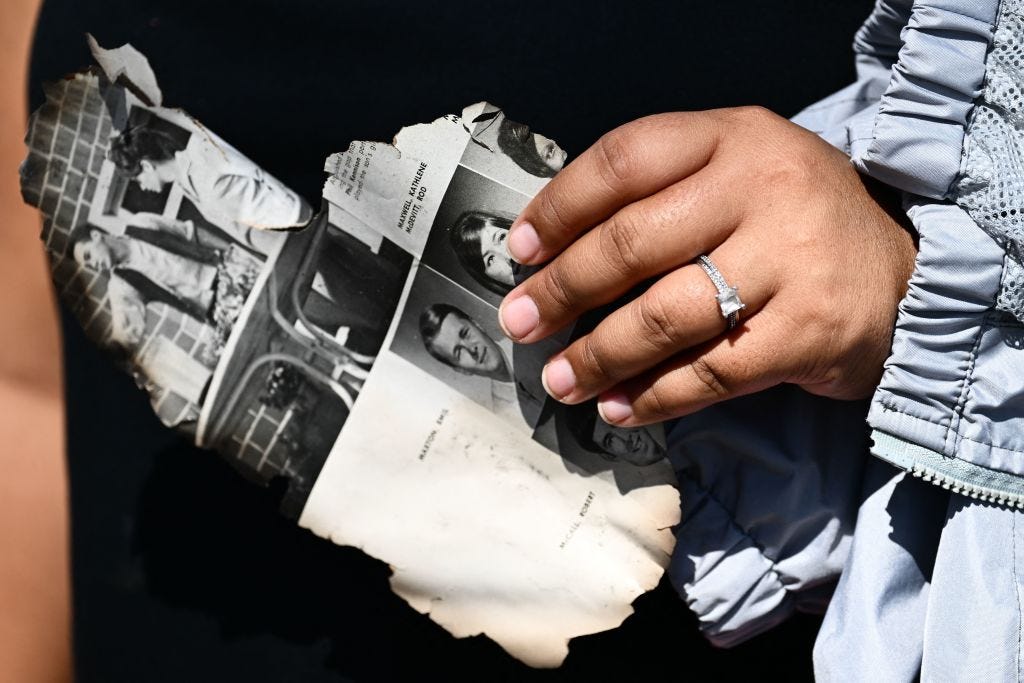
Further reading:
Hawaii AG to Probe Decisions and Policies on Wildfires. “Hawaiian state Attorney General Anne Lopez on Friday announced her office will conduct a "comprehensive review of critical decision-making and standing policies leading up to, during, and after the wildfires on Maui and Hawaii," which have killed dozens of people.” Common Dreams, August 12.
Lahaina Showcased Centuries of Hawaiian History. Now Its Gems are Gone. “Originally called Lā-hainā — which roughly translates as “cruel sun” in the Hawaiian language, a nod to the area’s dry, sunny climate — the town was known before the fire as a place where one could reflect on centuries of Hawaiian history simply by walking around.” New York Times, August 10.
The Scary Science of Maui’s Wildfires. “Like so many other places around the world, the island of Maui is being swept into the Age of Flames, also known as the Pyrocene.” Wired, August 10.
Hawaii Wildfires Spark Conspiracy Theory About 'Directed Energy Weapons' “The devastating wildfires in Hawaii have brought a new conspiracy theory from climate change deniers who suggest that the destruction was orchestrated by the federal government's directed energy weapons.” Newsweek, August 11.
Hawaii’s youth-led climate change lawsuit is going to trial next summer. “A circuit court judge ruled Thursday that the trial will start June 24 in Honolulu’s environmental court.“ Grist, August 7.
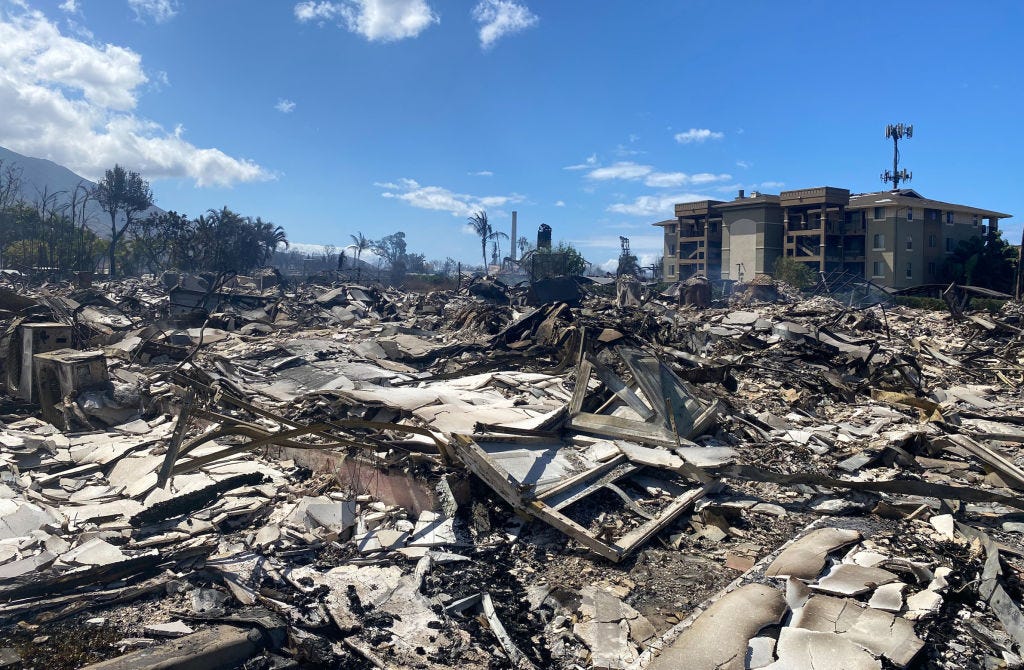
No comments:
Post a Comment